Latest Electric Cars & Bikes On Show Here
Hmmm.. I’m still not sure about electric cars.
The very latest in electric vehicle technology – including a car not yet released in New Zealand – went on show briefly yesterday at Queens Wharf as part of a sustainability event.
The numbers are impressive - $5 for a full charge compared to what you pay for petrol.
During a green guilt moment last year I contemplated a Prius but even second-hand they were too expensive and then came all those reports of Toyota recalls.
And the electric car technology is still in its experimental stage and the cars way too expensive - the Mitsubishi i-Miev can now be bought here but for $60,000.
And there’s the issue of how fast you can go and how you charge it as we’re not at the stage of charging systems on every street corner.
In my book the jury is out - but it’s still good to see that at least some of the big auto makers are starting to sing about alternative fuel technology, especially in the wake of that classic documentary on GM and how it Killed The Electric Car
So here are the cars that were on display.
Here’s how they get charged.
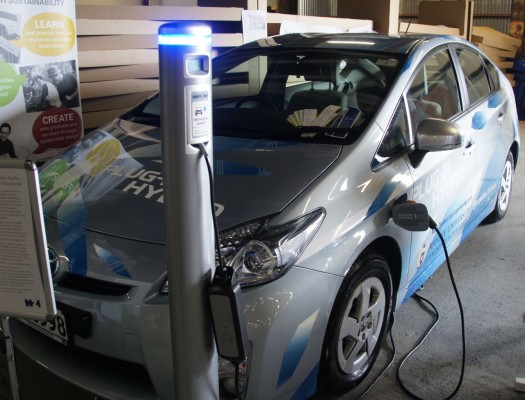
Toyota Plug-in Hybrid Prius
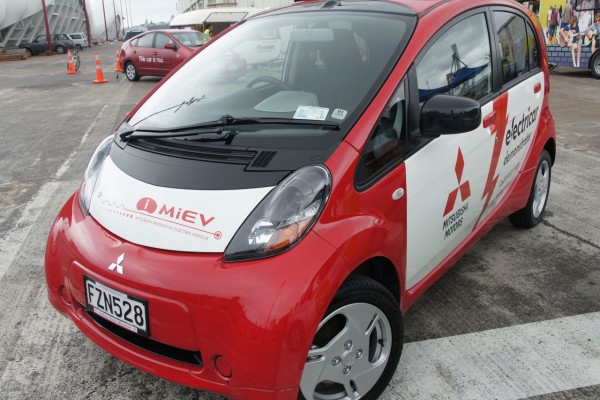
Mitsubishi i-Miev: $5 to fully charge
The Mitsubishi i-Miev costs only $5 to ‘fill’ or fully charge (at a cost of 25c / kWh).
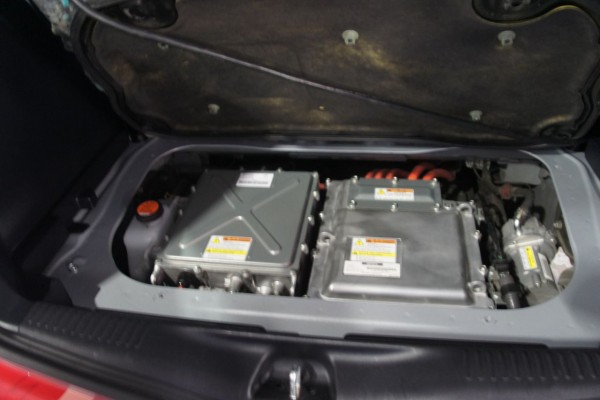
Batteries in the Mitsubishi i-Miev boot
The Nissan Leaf is not yet released in this country. It’s a fully electric five-seater that offers similar acceleration to 50km/h as a 3.5 litre petrol engine.
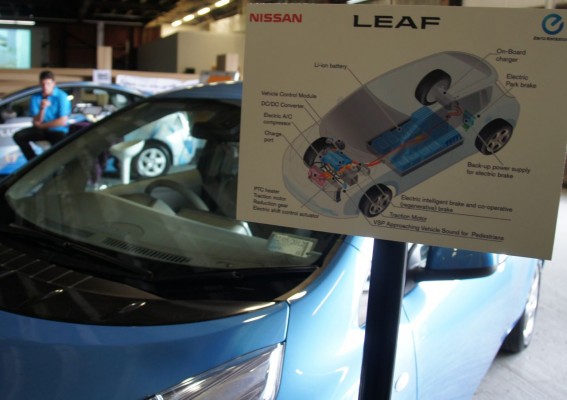
Nissan Leaf: A fully electric five-seater
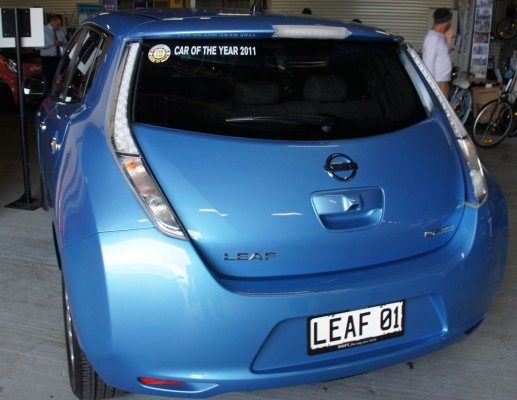
Toyota has selected New Zealand for a three-year global field trial of the Toyota Plug-in Hybrid Prius, which drives as electric-only for up to 30kms and converts to a petrol / electric hybrid over longer distances.
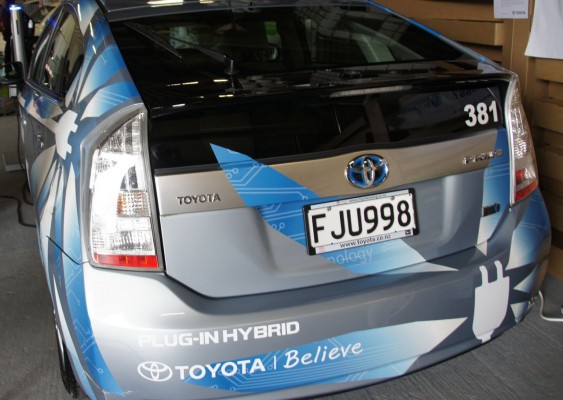
Toyota Plug-in Hybrid Prius drives as electric-only for up to 30kms
But what I’m really interested in are these eZee electric bicycles that seem to be around $3000.
They’re 10 cents a charge.
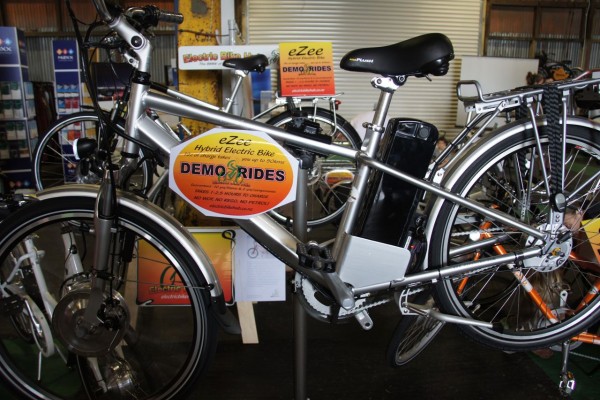
eZee electric bicycle - 10 cents a charge
According to their website you could convert your present bike into one. i might just do it.











19 Comments
On electric bikes do your research. Not all e-bikes are created equal. (The cheap Chinese ones aren’t worth it because of build quality) The e-Zee looks pretty unstylish to me. (It looks like a Chinese cheapie, but at a European e-bike price - I could be wrong, but danger,danger will robinson)
I have had a Wisper Sport for 2 years and think they’re great, but I’d go for a new bike and a kit next time, and not necessarily a cheap Chinese kit. Bionx from Canada are quite nice I think, albeit expensive (my info is at least 12 months old) and I’d be tempted to get a 500W one, but they’re illegal in NZ, which has a 250W limit. The EU rules are even more limiting and dumb. I’d be tempted to get a 500 W motor, and rub out the 500W and write 200W on it. Australia has a 200W limit which is really daft, and I would want to ride it over there sometimes too.
I really think that e-bikes could get a lot of cars off the roads, and negate the perceived need for yet more motorways. I love riding mine.
My dream bike would have an internal rear hub, 500W motor on the front, regenerative braking, and cheap easily interchangable lockable batteries, that don’t need the seat to be removed to change.
I’d also like to carry close to a kWh on the bike in battery storage. (I already do with a spare battery in my panniers)
I went for a brief bike ride on one of those e-Zee bikes, just to understand the concept. Very tempting to get one.
Thanks for your observations Matt.
@Matt - did you look at the electric mopeds? they look like a good commuter deal. I think petrol ones a re still a huge growth area, not sure about electric ones - they didn’t seem much dearer?
Do Electric Vehicles pay road user charges, like petrol in the petro price and diesel RUC’s?
@ Gary
They are temporally exempt to encourage uptake. That exemption will expire at some point (years away) and electric vehicles will then have to pay the same RUC’s as light diesels.
Mark, these electric bikes are Mopeds (motor assisted pedal cycles or Dernys in France and often used for motor paced cycle races. The vehicles our Act describe as Mopeds are low powered motor scooters and don’t have pedals….confusing
There is a big advantage to a true Moped over a low powered scooter (“Moped”) and that is they would fall into a category for road use, they are assisted bicycles. The “Mopeds” are neither motorcycles nor bicycles in our law. Therefore they can’t use motorways and they can’t use cycle ways. Also as a cyclist for decades I frankly believe motor scooters are more dangerous than bicycles.
An example of the disadvantages and I stand to be corrected would be travelling from Massey to the North Shore a low powered scooter(“Moped”) can not use the Greenhithe Bridge and would have to travel via Riverhead. A true Moped (power assisted cycle) would be allowed to travel via the cycleway to Greenhithe.
Just check out the Tesla model S when it comes to electric cars.
@Mark
Why would I want a moped?
I wanted a bicycle. e-bikes are essentially pedal bicycles.
Petrol mopeds should be banned, because the 2 stroke fumes and noise are intolerable. (If you don’t agree visit Bangkok or Hanoi and then tell me otherwise).
The Chinese electric scooters will fall apart on you within a month or two. They’re absolute rubbish.
Get a bike, a normal powered by Weetbix bicycle. If you’re old, lazy or a little bit fat, consider an e-bike. I still pedal my guts out on my e-bike, except I can ride 28km in an hour instead of 18km on my old mountain bike.
Anything with a petrol motor, and anything without functional pedals that the rider actually turns with leg power means that the thing should be banned from cycleways. Electric bikes are pedal cycles and up to 250W this is true under NZ law. e-bikes should be allowed, and indeed are able to be ridden on cycleways. I don’t think mopeds should be on any cycleway.
@Richard I think your definition of moped is not helping. e-bikes are bikes. They are not mopeds. We should match the definition to the NZ law, rather than the French language.
Some of the crappy electric scooters have joke pedals. This does not make them a bicycle.
Also a petrol-assisted bicycle - they should be banned too. Horrid things when I’ve come across them. All noise and stink.
Matt, That 500w e-bike you wanted would be classified as a moped here, and can be fully legal as long as you comply with the same laws as a scooter (number plate, lights, registration etc). Yes I know that’s probably not realistically viable.
See:
http://www.nzta.govt.nz/vehicle/classes-standards/class.html
Vehicles are classified by power/speed (and cylinder capacity if applicable) not if they look like a scooter or mountain bike.
I have always wondered. How much electricity would be needed if New Zealand has fully coverted to electric cars? I know it might take 40 years, but I just want to look at how much more Power Stations we would need…..
“And the electric car technology is still in its experimental stage”
Showing my pedantic side: The electric car has been a reasonably mature technology for about 100 years or so. It is the BATTERY technology which is still the limiter.
It is like someone having invented the modern internal combustion engine, but every private city runabout would have to pull a trailer with a tank full of petrol, because the energy density was too low.
So I remain very unconvinced - until battery power takes another leap (and preferably one that doesn’t poison the whole world with toxic chemicals or trace metals for the manufacturing), I don’t think e-cars or e-bikes will ever have mass-market chances.
Great headline about how GM killed the electric car - not. Yes, they were involved but they were hardly the only party in this.
http://en.wikipedia.org/wiki/Toyota_RAV4_EV
What about the Chevrolet (Holden) Volt?
I’m with max. The energy required to drag those inefficient, expensive, and heavy batteries around make them a poor option. Especially compared to tethered systems, you know, like metro systems….
They will be a way however, for some of the better capitalised part of the community to avoid paying petrol tax…. until I guess they get hit with RUCs…. which will make the math around their capital cost even less appealing.
I would look very carefully at the warrantees on the battery as well.
Patrick R. Less particulate pollution, and less noxious gasses may be the only reason to get an electric car, but yep they’re still a car.
When petrol is $5 a litre who knows.
Yeah Matt I agree, but when petrol is $5 the world economy contracts and we all can even less afford to replace the car fleet. Way better that we invest in alternatives for all now, and that means current and sustainable technology, oh like a metro system.
We are witnessing not a temporary recession but a discontinuity, and the increasing scarcity and cost of extraction of vital fuels play a way bigger role in causing this than the general discourse admits. The world economy is not going back to ‘normal’. Normal is over. That’s why those politicians that say; ‘trust us, it’ll be fine’ are the most dangerous; because they are trying to persuade us not to change or prepare for change. And we will change; either by choice or when it is forced on us. The former would be much more pleasant.
Electric vehicle technology is rapidly evolving & it will not be long before there will be a car/vehicle, probably in the next 2-5 years that will meet the requirements for everyday driving including towing trailers.
Developers are concentrating on battery weight, extending travel distance & quicker recharge times.
The current major draw back in electric vehicles is the time to recharge the battery. Currently using modern batteries that can get the recharge time down 2-3 hours for a full recharge but it is the ‘top up recharging’ for extend travel distances coming from regenerative braking, built in wheel generators/motors &/or solar power (with panels built into the roof) is the problem. With the ‘Top Up Recharging On the Go’ concept, there needs to have a battery that can be accept continual recharging without deteriorating the battery but at the same time, giving the battery an operating life of at least 100,000 to 200,000 kms before being replaced, with a replacement price not exceeding US$1000-US$2000 & is also environmental friendly in its disposable.
The Toyota Previa battery has a 100,000km battery warranty & currently costs NZ$3500 + GST for new battery exchange. Toyota has brought the battery down after the taxi owners using the Previa complained about the price. Toyota has a Camry in hybrid configuration & apparently NZ Taxi Federation is monitoring its performance as a 5 seater taxi for NZ conditions.
The Germans, Japanese & Koreans are looking at the ‘Top Up Recharging On the Go’ concept. This concept means the battery will start the vehicle moving by using the battery (similar to the Hybrid model where petrol engine starts the vehicle moving) & depending on the environmental conditions the vehicle is in, solar and/or wheel generator would provide the motive energy after a certain speed, meaning the battery will not be used if the the vehicle maintains the movement higher that minimum speed.
Electronics will monitor the vehicle speed & battery level. If the battery charge level drops below a certain level, then the battery will then be recharged. Regenerative braking will provide additional power for travel &/or recharging the battery.
The electronics monitoring power current to the vehicle motors & to the battery, battery level & when to switch from battery to generator/solar power - is currently available, as it is similar to the technology used in hybrids.
The vehicle will use motors built into the wheel hubs on the back wheels (providing direct drive - similar to the concept used in light rail) & the generators would be built into the hubs of the front wheels. Additional power source from solar panels would be built in the vehicle roof. This would allow the vehicle to operate in hot and could environments.
At night, the vehicle’s owner would plug into household power socket for a top up, so the next day the battery is fully charged.
This will allow the vehicle to have unlimited range compared to current range of 500kms that is currently available.
With regards to Max & Patrick R comments about battery weight, batteries are becoming lighter and thinner as battery technology improves. You will have noticed with your cellphone &/or laptop, that their batteries have become smaller, lighter & have have longer battery life compared to 5 years ago. It is cellphone/laptop battery technology that is driving the renewed interest in electric vehicle development.
“Additional power source from solar panels would be built in the vehicle roof. ”
Sorry, but unless you are also inventing DRAMATICALLY more powerful solar cells, any little bit of power you get from a roof-mounted cell is just going to be a greenwash.
“It is cellphone/laptop battery technology that is driving the renewed interest in electric vehicle development.”
That is true in many a sense - but you may have also read the stories about how the drive for scarce / toxic metals and other “ingredients” for such high-energy storage devices is already an environmental issue in many areas. Further, there is a difference between powering a few billion small cell phones and a few billion cars - especially if you then also assume spare batteries for each. I am hoping that those issues can be overcome, but I fear that this may end up a “flying car” type of thing - there’s various proof-of-concept and small-series flying cars around in the world, but they never made mass market, and we have been told they will happen soon so many times…
So a “true” (rather than hybrid) electric car is still a long while (and maybe even a few major inventions) out, in my view. Happy to be proven wrong, though.
For Max
This is nothing to do with ‘flying cars’ or electric vehicles running on solar energy as it main power source.
The reality is, the technology mentioned in my blog is with us now - not in the future.
I am not sure if you are aware, there was an electric vehicle that was powered entirely by solar power that traveled from Perth to Sydney about three weeks ago. Sure this vehicle only carried 2 people, was small & light weight but if proved a point that with continual research, solar panels could be used to power a vehicle or be one of a power source to help in battery recharging.
What I mentioned about the concept being used in my blog, is already being trialled by Toyota, Mitsubishi, Honda, Mercedes, Daimler & Audi in their test vehicles.
As I mentioned, the biggest draw back with electric vehicles using batteries, is travel distance on a single charge, the weight & recharge times.
Research is being carried out on how to reduce recharge times. Reduction in recharge times & extend charge, is noticeable in high power usage smartphones & computer pads but is still not enough when you are powering a 5 seater vehicle with luggage & a trailer.
The battery technology in cellphones & computer, is being looked at in overcoming the problems of car battery.
Yes, I have read stories about how the drive for scarce / toxic metals and other “ingredients” for such high-energy storage devices is already an environmental issue in many areas. This does concern me, as we are not putting much effort in recycling the metals that are used. Hence as mentioned in my blog, if we are developing solar/battery technology, this technology needs to have solutions for environmental friendly disposal &/or recycling.
Another environmental disaster that is looming is palm oil. There hasn’t been much thought in the long term effects of continual farming of palm oil. There is already an effect on the tropical rain forests, especially the Amazon basin which is now experiencing environmental problems. If the Amazon basin starts to fail then we are in deep trouble.
We have start to think outside the square & change our habits or the human species will be under serious threat in the next 50 to 100 years if we continual to have half heart attempts to change the way we do things.
Anyone heard of a swiss e-bike called the Stromer?
They are awesome but……not yet available in NZ
Can someone PLEASE start importing these.
http://www.youtube.com/watch?v=e2CM0NWDaLk